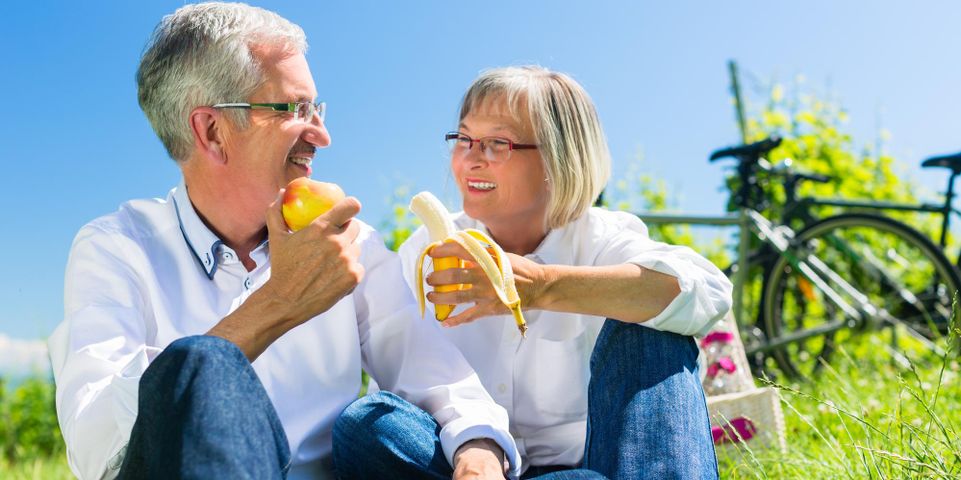
If you’re active and engaged in your golden years, you want to do whatever possible to ensure every day is vibrant and healthy. A vital part of senior living is eating well with your changing needs in mind. Keep the following in mind for a balanced diet that will keep you doing the things you love.
The Top 5 Factors in a Healthy Senior Diet
1. Fiber-Rich
Independent senior living means feeling good. But as people age, digestion often slows down, decreasing energy and leading to uncomfortable digestive complaints. Eating fiber-rich food helps to keep digestion moving smoothly. Raspberries, beans and lentils, leafy greens, or whole grains are all a wonderful start.
2. Protein-Packed
 Lean meats, low-fat dairy, nuts, and seafood all have necessary protein to help the body repair itself—especially after any kind of injury or surgery. Avoid fatty cuts of meat like bacon or prime rib and whole-fat dairy products unless recommended by your doctor. Salmon, chicken, buffalo, sugar-free yogurt, almonds, and cashews are good choices.
Lean meats, low-fat dairy, nuts, and seafood all have necessary protein to help the body repair itself—especially after any kind of injury or surgery. Avoid fatty cuts of meat like bacon or prime rib and whole-fat dairy products unless recommended by your doctor. Salmon, chicken, buffalo, sugar-free yogurt, almonds, and cashews are good choices.
3. Mineral-Abundant
Minerals such as magnesium, potassium, and calcium help keep bones strong, the heart healthy, and the immune system functioning well. Many seniors don’t get enough of these vital substances. Bananas, pistachios, and avocados are excellent sources of potassium. Leafy greens such as kale are filled with calcium, as are quality dairy products such as kefir or yogurt. Magnesium is found in many veggies, nuts, and fruits as well as whole grains.
4. Vitamin B-12
This vitamin is the most bio-available in meat, eggs, and dairy products, but it’s also found in whole-grain foods. As you age, the ability of stomach acid to release B-12 from food decreases. This vitamin helps keep the nervous system healthy and makes red blood cells, and it’s often associated with higher levels of energy. Talk to your doctor about taking B-12 as a supplement or as injections if you aren’t getting enough from food.
5. And Water, Too
Though not strictly a food, water is essential for optimal senior living. While there is no formula for how much to drink, take the eight 8-ounce servings per day as a guide. Seniors are less sensitive to thirst, so you may not be able to rely solely on your body’s signals to get enough. Headaches, fatigue, and constipation can indicate dehydration, so if you have these symptoms on a regular basis, consider upping your water intake.
For active, independent seniors, nutrition is key to enhancing health and endurance. So is an involved community. Cathedral Towers, in Atlanta, GA, is an affordable, fun, independent senior living complex that offers spacious apartments, an active community and recreational options, and proximity to entertainment and shopping—all in the heart of vibrant Midtown. Call (404) 231-3020 to ask about a tour or visit their website to learn more about the apartments.
About the Business
Have a question? Ask the experts!
Send your question

